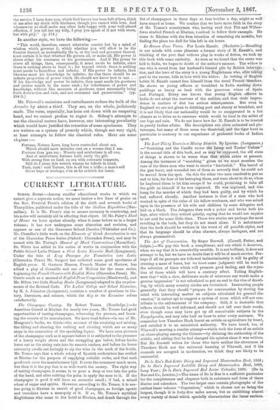The Art of Conversation. By Roger Boswell. (Cassell, Petter, and
Galpin.)—We pay this book a compliment, and one which it deserves, when we say that it is remarkably sensible. It is not brilliant, it does not attempt to be, but we have no doubt that it will be of much service. Per- haps if all its precepts are followed indiscriminately it will be guilty of creating a mass of bores, but we trust some judgment will be used in the selection of hints which will promote good feeling, and the rejec- tion of those which will have a contrary effect. Telling English- men that " with a slow, deliberate mode of utterance our words make a greater impression" is not calculated to put an end to the vice of drawl- ing, by which many country circles are victimized. Instructing people generally that they should "prepare for conversation by storing the mind with interesting matter on subjects calculated for general dis- cussion," is rather apt to suggest a system of cram which will not con- tribute to the enlivenment of the company. Still, it is desirable that talkers should be well informed, and should not fall over their words, even though some may have got up all conceivable subjects in the Encyclopcedia, and may take half an hour to utter every sentence. We remember how Theodore Hook learnt an article on agriculture by heart,, and retailed it to an astonished authority. We have heard, too, of Whe well's meeting a similar attempt—which took the form of an article
on chess-playing among the Chinese—by claiming the authorship of the article, and adding that he had changed his opinion since it was written.
But Mr. Boswell writes for those who have neither the cleverness of Theodore Hook nor the universal learning of Whewell, and if his counsels are accepted in moderation, we think they are likely to be successful.






























 Previous page
Previous page